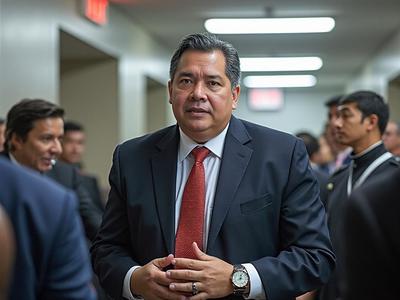
Salvadoran Journalist Javier Antonio Hércules Salinas Killed in Honduras Despite Security Protections
The assassination of Hércules highlights ongoing violence against journalists in Honduras, raising concerns ahead of upcoming elections.
Javier Antonio Hércules Salinas, a Salvadoran journalist, was shot and killed in Santa Rosa de Copán, Honduras, approximately 200 kilometers northwest of the capital city, Tegucigalpa.
The attack occurred while he was driving his taxi, a side job he undertook to support his family.
Hércules, employed by the local media outlet A Todo Noticias, had lived in Honduras for five years with his wife and children.
Despite being under state protection since 2023, he represents the latest victim in the ongoing violence against journalists in a country noted for being one of the most perilous for the press in Latin America.
Hércules was part of Honduras’ Protection Mechanism for Human Rights Defenders, Justice Operators, and Journalists, which is intended to safeguard individuals at risk due to their work.
However, the system's failure to protect him has drawn significant concern.
Local authorities confirmed the ambush and many observers link the attack directly to his journalistic activities.
Dina Maza, Executive Director of the Association for Democracy and Human Rights, stated that the killing is indicative of the dangerous environment for reporters due to the intersection of drug trafficking, organized crime, and hostile political elements in the region.
Maza reiterated that Hércules had previously faced attempts on his life, which led to his designation for protection.
The murder occurs in a tense political context, just months ahead of Honduras’ national elections scheduled for November 2025. Maza warned that journalists may face increased threats as political tensions escalate.
She remarked that this incident is reflective of a broader trend throughout Honduras, predicting more violence against the media.
In response to Hércules' killing, the Honduran College of Journalists (CPH), under the presidency of Juan Carlos Sierra, condemned the murder and called for a thorough and transparent investigation.
Sierra expressed sorrow over the inadequate protections offered by the state, highlighting the devastating impact on both Hércules' family and the journalistic community.
Local news outlets, including Radio América, echoed these demands alongside Honduran Secretary of Human Rights Longino Becerra, who emphasized the need for justice against those responsible for the murder and the perpetrators who instigated it.
This incident resonates across Central America, where journalists frequently encounter severe risks, including intimidation and assassination, particularly when exposing issues linked to corruption or crime.
While Costa Rica is relatively safer, it is not immune to pressure against reporters, especially those investigating matters related to drug trafficking or governmental misconduct.
Honduras has a troubling history regarding violence against journalists, with minimal improvement despite established protection measures.
More than 100 journalists have been killed since 2001, with an alarming 95% of these cases remaining unsolved, contributing to a culture of impunity.
High-profile cases, such as the 2016 assassination of environmental activist Berta Cáceres, underline the challenges faced in achieving justice, particularly when influential interests are involved.
Although authorities have commenced an investigation into Hércules’ murder, skepticism remains about the government’s ability to effectively address such patterns of violence against media professionals.
The attack occurred while he was driving his taxi, a side job he undertook to support his family.
Hércules, employed by the local media outlet A Todo Noticias, had lived in Honduras for five years with his wife and children.
Despite being under state protection since 2023, he represents the latest victim in the ongoing violence against journalists in a country noted for being one of the most perilous for the press in Latin America.
Hércules was part of Honduras’ Protection Mechanism for Human Rights Defenders, Justice Operators, and Journalists, which is intended to safeguard individuals at risk due to their work.
However, the system's failure to protect him has drawn significant concern.
Local authorities confirmed the ambush and many observers link the attack directly to his journalistic activities.
Dina Maza, Executive Director of the Association for Democracy and Human Rights, stated that the killing is indicative of the dangerous environment for reporters due to the intersection of drug trafficking, organized crime, and hostile political elements in the region.
Maza reiterated that Hércules had previously faced attempts on his life, which led to his designation for protection.
The murder occurs in a tense political context, just months ahead of Honduras’ national elections scheduled for November 2025. Maza warned that journalists may face increased threats as political tensions escalate.
She remarked that this incident is reflective of a broader trend throughout Honduras, predicting more violence against the media.
In response to Hércules' killing, the Honduran College of Journalists (CPH), under the presidency of Juan Carlos Sierra, condemned the murder and called for a thorough and transparent investigation.
Sierra expressed sorrow over the inadequate protections offered by the state, highlighting the devastating impact on both Hércules' family and the journalistic community.
Local news outlets, including Radio América, echoed these demands alongside Honduran Secretary of Human Rights Longino Becerra, who emphasized the need for justice against those responsible for the murder and the perpetrators who instigated it.
This incident resonates across Central America, where journalists frequently encounter severe risks, including intimidation and assassination, particularly when exposing issues linked to corruption or crime.
While Costa Rica is relatively safer, it is not immune to pressure against reporters, especially those investigating matters related to drug trafficking or governmental misconduct.
Honduras has a troubling history regarding violence against journalists, with minimal improvement despite established protection measures.
More than 100 journalists have been killed since 2001, with an alarming 95% of these cases remaining unsolved, contributing to a culture of impunity.
High-profile cases, such as the 2016 assassination of environmental activist Berta Cáceres, underline the challenges faced in achieving justice, particularly when influential interests are involved.
Although authorities have commenced an investigation into Hércules’ murder, skepticism remains about the government’s ability to effectively address such patterns of violence against media professionals.







